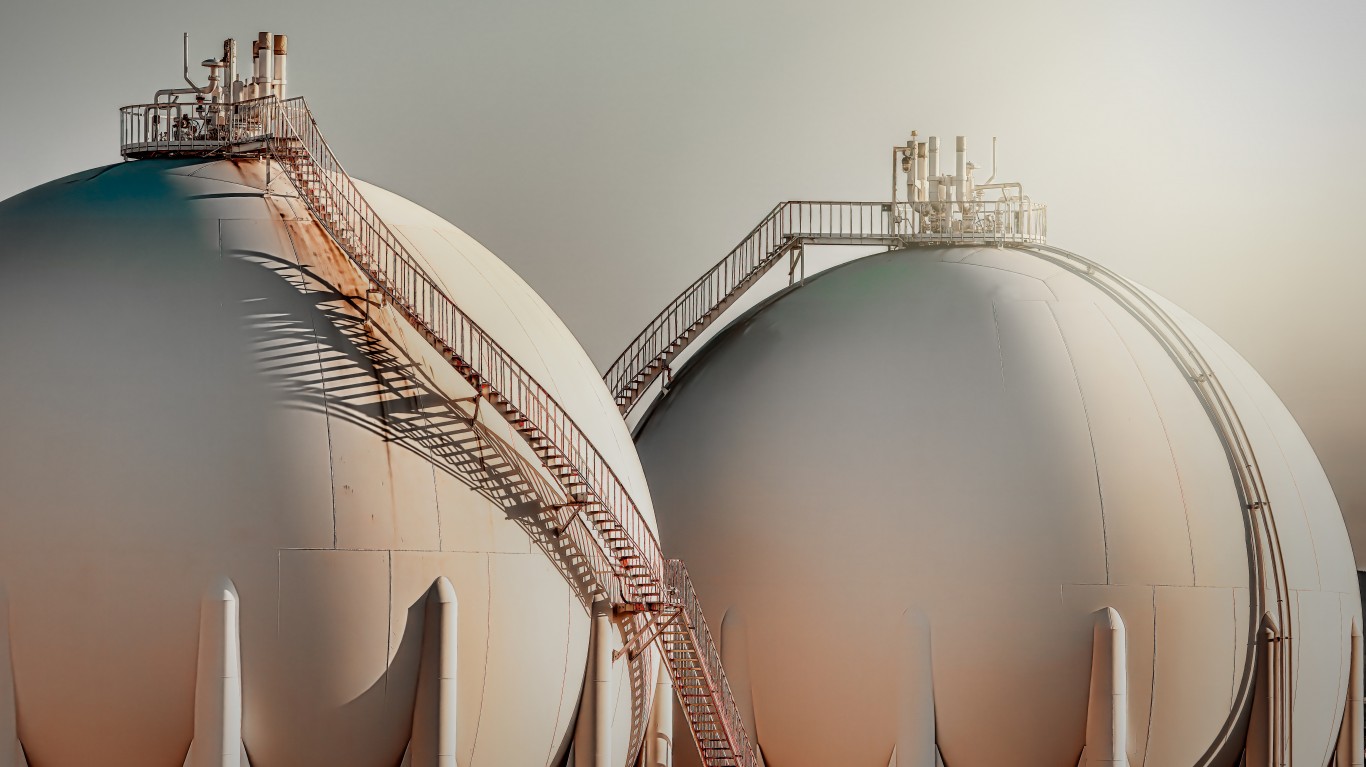
The energy sector had a stellar 2022, but it has been largely sitting out the recent broader market rally. The S&P 500 Energy Index is down by over 8% year to date, compared to a gain of over 6% in the past year.
In general, the performance of the energy sector depends on the prices of the underlying commodities, which have been stagnant lately. However, oil prices are expected to rise with the increase in seasonal demand in the spring, which could boost energy stocks. Let’s take a look at the five best- and worst-performing energy stocks in Feb. 2023.
The Five Best-Performing Energy Stocks In Feb. 2023
We have used the February return data of energy stocks from finviz.com to rank the five best- and worst-performing energy stocks in Feb. 2023. We only considered stocks with a market capitalization of more than $10 billion as of Mar. 1 for our list of five best- and worst-performing energy stocks in Feb. 2023.
These were the five best-performing energy stocks in Feb. 2023:
5. Targa Resources (-2%)
Targa Resources Corp (NYSE:TRGP) shares are up by more than 2% year to date and have risen over 11% in the last year. As of the time of this writing, Targa Resources shares are trading at around $72 with a 52-week range of $55.56 to $81.50, giving the company a market capitalization of more than $16.6 billion. It has a P/E ratio of around 18.7.
4. Coterra Energy (-1%)
Coterra Energy Inc (NYSE:CTRA) shares are up by more than 7% year to date, bringing its one-year return to about 6%. As of the time of this writing, Coterra Energy shares are trading at around $25 with a 52-week range of $22.76 to $36.55, giving the company a market capitalization of more than $18.5 billion.
3. MPLX (-1%)
MPLX LP (NYSE:MPLX) shares are up by over 6% year to date, bringing their one-year gain to more than 10%. As of the time of this writing, MPLX shares are trading at around $34.60 with a 52-week range of $27.46 to $35.49, giving the company a market capitalization of more than $34.7 billion. It has a P/E ratio of around 9.2.
2. EQT (1%)
EQT Corp (NYSE:EQT) shares are down by over 3% year to date but are up by almost 20% over the last year. As of the time of this writing, EQT shares are trading at around $30.69 with a 52-week range of $25.44 to $51.97, giving the company a market capitalization of more than $11 billion. It has a P/E ratio of around 7.3.
1. Cheniere Energy (5%)
Cheniere Energy, Inc. (NYSEAMERICAN:LNG) shares are up by almost 7% year to date, bringing their 12-month gain to almost 19%. As of the time of this writing, Cheniere Energy shares are trading at around $150 with a 52-week range of $120.09 to $182.35, giving the company a market capitalization of more than $36.6 billion. It has a P/E ratio of around 26.7.
The Five Worst-Performing Energy Stocks In Feb. 2023
These were the five worst-performing energy stocks in Feb. 2023:
5. EOG Resources (-16%)
EOG Resources Inc (NYSE:EOG) shares are down by more than 12% year to date and off by more than 4% over the last year. As of the time of this writing, EOG Resources shares are trading at around $109 with a 52-week range of $92.16 to $150.88, giving the company a market capitalization of more than $64 billion. It has a P/E ratio of about 8.3.
4. APA (-16%)
APA Corp (NASDAQ:APA) shares are down by more than 20% year to date, dragging their 12-month return down to about -5%. As of the time of this writing, APA shares are trading at around $35 with a 52-week range of $30.15 to $51.95, giving the company a market capitalization of more than $10.8 billion. It has a P/E ratio of about 3.2.
3. ConocoPhillips (-16%)
ConocoPhillips (NYSE:COP) shares are down by over 10% year to date but are up more than 6% in the last year. As of the time of this writing, ConocoPhillips shares are trading at around $101 with a 52-week range of $78.30 to $138.49, giving the company a market capitalization of about $123.5 billion. It has a P/E ratio of about 6.9.
2. Ovintiv (-17%)
Ovintiv Inc (NYSE:OVV) shares are down by over 21% year to date and off by more than 14% over the last year. As of the time of this writing, Ovintiv shares are trading at around $37 with a 52-week range of $36.11 to $63.30, giving the company a market capitalization of more than $9 billion. It has a P/E ratio of about 2.6.
1. Devon Energy (-17%)
Devon Energy Corp (NYSE:DVN) shares are down by more than 15% year to date and off by more than 7% over the last year. As of the time of this writing, Devon Energy shares are trading at around $49 with a 52-week range of $48.31 to $79.40, giving the company a market capitalization of about $32.2 billion. It has a P/E ratio of about 5.4.
This article originally appeared on ValueWalk
It’s Your Money, Your Future—Own It (sponsor)
Are you ahead, or behind on retirement? For families with more than $500,000 saved for retirement, finding a financial advisor who puts your interest first can be the difference, and today it’s easier than ever. SmartAsset’s free tool matches you with up to three fiduciary financial advisors who serve your area in minutes. Each advisor has been carefully vetted and must act in your best interests. Start your search now.
If you’ve saved and built a substantial nest egg for you and your family, don’t delay; get started right here and help your retirement dreams become a retirement reality.
Thank you for reading! Have some feedback for us?
Contact the 24/7 Wall St. editorial team.





